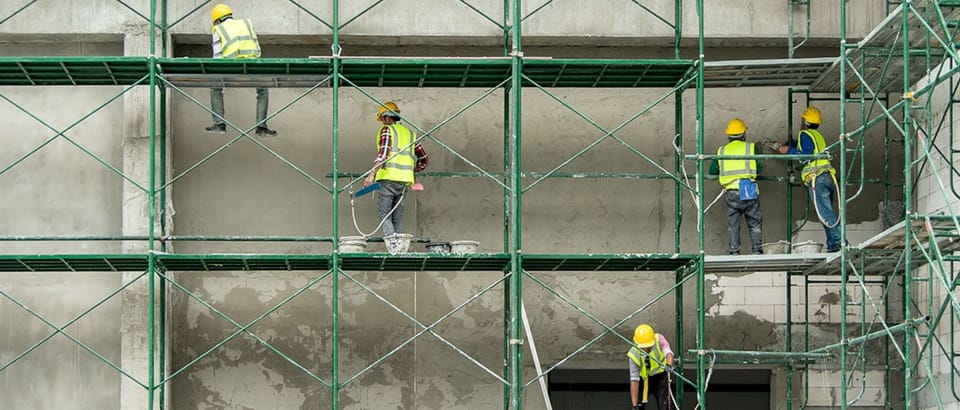Scaffolding

Summary:
Scaffolding is erected and utilized to work at heights on larger projects of longer duration where a ladder would not be enough. All scaffolding must be used in accordance with manufacturers’ instructions.
- A rolling scaffold must not be moved while workers are on it
- Make sure work area is always safe
- Always take great care when working at heights – particularly in public areas
- Be aware of overhead hazards
- Report any defects to a supervisor
Hazards:
- Working at heights
- Environmental
- Serious injury / death
- Pinch points
- Muscle Strain Injuries
- Slip / Fall
- Overhead Hazards
Personal Protective Equipment (PPE) Required:
- CSA Approved Protective Footwear
- Hard Hat
- Gloves (as needed)
- High Visibility Apparel (as needed)
- Fall Protection Harness when required
Pre-set up Procedure:
- Set up safe work zone
- Inspect surface area where scaffolding will be erected for evenness, stability and slope.
- Check for overhead hazards
- Inspect equipment for wear and tear
Procedure:
All scaffolding onsite must be erected as follows:
- with the end frames plumb and all cross bracing in place
- the base must have bearing plates or sills that rest on a solid surface and are sufficient to support the weight of the scaffold
- effectively guyed or secured to a building or structure if the height exceeds three times its minimum base dimension, or in any other circumstances if required for stability
- unless otherwise specified by the manufacturer, height adjustment devices must not extend more than ⅔ of their total length or 24″, whichever is less
- all connections between the parts must be secure
Scaffolds erected above 10′ must always have guardrails installed in accordance with established company procedures (Fall Protection), unless:
- the platform is adjacent to a structure that provides protection equivalent to guardrails
- the open space between the platform and the structure is equal to or less than 12″
Scaffold decking must meet the following requirements:
- minimum width of 20″, except when used with ladder jacks, pump jacks, or similar systems, a 12″ wide work platform may be used
- not have more than one opening in the work platform, no greater than 10″ wide
- designed to ensure adequate footing for workers using the platform if the platform is not level
- All lumber used to construct a scaffold must be graded and marked to the National Lumber Grades Authority Standard Grading Rules for Canadian Lumber.
Post Procedure/Take Down:
- Take great care while dismantling and passing down scaffolding components
- Make note of and report any damage to components
- Clean work area
- Store equipment appropriately
